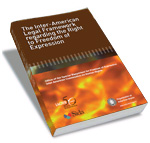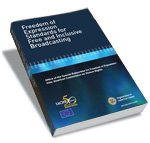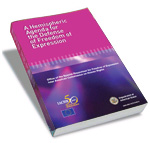Freedom of Expression
Freedom of Expression and Poverty
Challenges to Freedom of Expression, Intervention by Catalina Botero, Special Rapporteur for Freedom of Expression of the OAS.
Country Reports
- Justice and Social Inclusion: The Challenges of Democracy in Guatemala
(2003)
Chapter VII, para. 389
Basic Principle
Declaration of Principles on Freedom of Expression adopted by the Inter-American Commission on Human Rights in 2000.
Publications
 The Inter-American Legal Framework Regarding the Right to Freedom of Expression
The Inter-American Legal Framework Regarding the Right to Freedom of Expression ![]()
The objective of this publication is to present inter-American jurisprudence that defines the scope and content of this right in a systematic and updated way. Among the most important topics it highlights: the importance, function, and characteristics of the right to freedom of expression, as well as the types of speech protected; the prohibition of censorship and indirect restrictions; the protection of journalists and social communications media; the exercise of freedom of expression by public officials; and freedom of expression in the area of electoral processes.
 Freedom of Expression Standards for Free and Inclusive Broadcasting (2009)
Freedom of Expression Standards for Free and Inclusive Broadcasting (2009) This publication shows the guidelines that have been developed by the Inter-American Court and the Inter-American Commission and the Office of the Special Rapporteur for Freedom of Expression, regarding the need for an adequate regulation of the radioelectric spectrum to ensure free, independent, vigorous, plural, and diverse broadcasting, to insure, as a result, the greatest circulation of information and opinions.
 A Hemispheric Agenda for the Defense of Freedom of Expression (2009)
A Hemispheric Agenda for the Defense of Freedom of Expression (2009) This publication, in addition to summarizing the inter-American standards for freedom of expression, recognizes the regional advances achieved in the Americas with respect to the full guarantee of the right to freedom of expression, describes the main difficulties and challenges currently facing the right to freedom of expression in the region, and presents a series of concrete, viable and feasible recommendations that the Office of the Special Rapporteur considers necessary to face these challenges.

